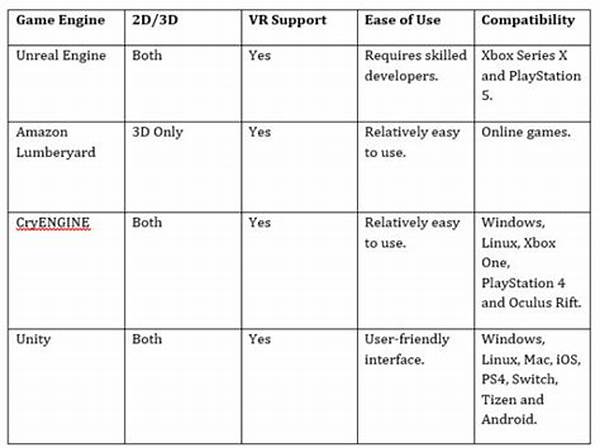Once upon a time in the thrilling world of game development, a group of passionate developers embarked on a quest. Their mission? To discover the ultimate gaming engine that could support grand ideas across multiple platforms. This journey took them through uncharted territories filled with powerful tools and innovative technologies. As they ventured deeper, they encountered engines that promised to be the bridge between imagination and reality. Join us as we dive into this epic saga of multi-platform gaming engine comparison.
Read Now : Intellectual Property Protection Strategies
Exploring the Top Contenders
In the realm of multi-platform gaming engine comparison, several titans stand ready to fulfill the dreams of creators. First up, we have Unity, the superstar known for its versatility. It’s like that cool kid in school who can hang with any crowd—be it mobile, console, or PC. Unity’s got the chops to bring ideas to life with its plethora of plug-ins and a vibrant community that’s always ready to lend a hand.
Next, there’s Unreal Engine, the powerhouse that’s all about bringing AAA-quality visuals to even the smallest of projects. With its visual scripting system, Blueprint, even novices can weave some magic without breaking a sweat. And let’s not forget Godot, the underdog with a heart of gold. It’s open-source, which means it’s always evolving, shaped by the very hands of the community that loves it.
Though each has its superpowers, the quest for the best engine in this multi-platform gaming engine comparison isn’t about picking a favorite—it’s about finding the right fit for the adventure at hand. Whether you’re aiming for photorealism or simplicity, there’s an engine crafted just for your tale.
Key Features of Popular Engines
1. Unity: Flexes its muscles in multi-platform deployment, offering developers the chance to deliver content everywhere, without breaking the bank. Perfect for indies and AAA devs alike.
2. Unreal Engine: The go-to for high-fidelity graphics and stunning visuals. Offers a cinematic experience with its cutting-edge rendering capabilities.
3. Godot Engine: It’s free and open-source, making it the darling of indie developers. Plus, it boasts an intuitive scene system for easy game design.
4. CryEngine: Known for jaw-dropping visuals and realism. Ideal for shooters and immersive simulations that demand next-level detail.
5. Cocos2d-x: Lightweight and perfect for mobile games. It’s the engine that lets you skip through basic 2D and 3D game development without all the fluff.
These aspects are part of what makes the world of multi-platform gaming engine comparison so exciting and diverse.
The Battle of Customization
Customization is the name of the game in multi-platform gaming engine comparisons. In this wild west, Unity stands tall with its integrative Asset Store. It’s like Disneyland for developers—whatever you need, there’s a high chance you’ll find it. From scripts to textures, Unity’s got you covered without the hassle of reinventing the wheel.
Unreal Engine isn’t just sitting back, though. Its Blueprint system is like the cheat code we all wish we had growing up. Dive into development without touching a single line of code—or if you prefer, code away with C++. Want to flip a scene upside down? Blueprints are here to make those dreams a reality.
Godot, on the other hand, takes a community-driven approach. Its open-source nature means if you can dream it, you can code it. Tweak the engine itself for the ultimate personalized experience.
Read Now : “decentralized Application Programming Challenges”
Comparing Performance and Optimization
When it comes to multi-platform gaming engine comparison, performance is king. Unity shines with its adaptive performance tools that cut across platforms like butter. It’s like the beloved shape-shifter in your favorite RPG game—always ready to fit your needs.
Unreal Engine rolls up with Nanite technology, which automatically crunches down polygons without sacrificing quality. It’s almost like magic, simplifying complex scenes so they run smoother than a cat sneaking across a wooden floor.
Godot’s lightweight framework means less bloat and faster execute times, especially on smaller devices. Each engine fine-tunes the player’s experience to make sure that unicorns gallop smoothly, and quests don’t lag.
Community and Support: Friends in the Right Places
One of the unsung heroes in any multi-platform gaming engine comparison is the strength of the community. Unity boasts a gigantic network of developers who’ve seen it all. Got a problem? Chances are, someone out there in Unity land has already faced it and conquered.
Unreal Engine brings the glitz and the glam with its online forums, plus masterclass tutorials that would make a university lecturer slightly envious. They’ve got a Plan B, C, and D for every possible bump in the road.
Not to be outdone, Godot embraces its open-source roots, with a community that’s constantly pushing the boundaries. Collaboration is key here, and everyone’s invited to the party.
Future-Proofing Your Game Projects
Future-proofing is crucial in multi-platform gaming engine comparison. With the fast pace of tech advancements, you want your engine to be in it for the long haul. Unity and Unreal both have a solid track record of innovation and updates. It’s like investing in a trusty pair of sneakers that are always being upgraded.
Godot, being open-source, keeps rapidly evolving. Its updates are fueled by collective creativity, providing robust solutions for the modern developer’s needs. Your adventure needs a map that adapts to new paths as they appear.
Wrapping Up the Engine Quest
Our journey through the world of multi-platform gaming engine comparison comes to an end, but the adventure has just begun for you. Each engine has its personality, its strengths, its quirks. Unity is adaptable and welcoming, Unreal is sleek and powerful, while Godot is flexible and approachable.
Choosing the right engine depends on your quest’s requirements. Some will swoon for Unity’s vast toolbox, others will chase after Unreal’s jaw-dropping vistas, while some will find solace in the customizable nature of Godot. So, gird your loins, start your engines, and embark on the next big gaming adventure with the insights of a multi-platform gaming engine comparison at your side!



